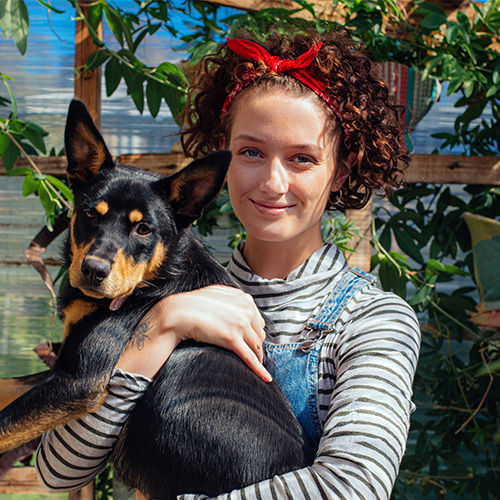Charles Sturt University’s Olive Lockett had no thoughts of doing an honours degree when she first graduated with a Bachelor of Business1, specialising in marketing. Elated with the successful culmination of three years of study, Olive wasn’t considering tackling any more.
But those around her had other ideas! Olive was doing casual work at Charles Sturt and her then boss, together with a former lecturer (and soon to be honours supervisor) began to sow the seed of doing an honours degree. Fast forward one year, and Olive graduated with a Bachelor of Business (Honours) – and was recognised with a University Medal to boot!
So, we asked Olive to give us some insight into how to get an honours degree. Wondering ‘what is an honours degree?’. Let’s find out!
So, what is an honours degree?
Honours students will define a problem, design and conduct experiments and/or surveys, and then wrap it all up in a dissertation.
“Doing honours is colloquially known as the fourth year of your bachelor’s degree. Everyone who undertakes an honours year has to conceive an area of research that is unique, research it and then write about it in a dissertation. Honours is a year of conducting original, rigorous and challenging research and then presenting your findings.
“For me, the whole year was one giant research project. You work towards producing one document that addresses one theme.”
How long does it take to complete an honours degree?
It usually takes one year of full-time study or two years of part-time study. Olive chose the former.
“I decided to dive all-in and study full-time, thinking ‘if I’m in this, I’m going to do it properly’, so I dedicated an enormous amount of time to doing honours. It was my focus. At the time, I had three casual jobs, so the first thing I did was decrease my workload.”
Why you should do an honours degree
Here are four reasons you might choose to pursue honours study.
- Challenge yourself.
- Put something unique into the world.
- Make an impact.
- A springboard to further study.
“While sometimes an honours year is required if you want to pursue further study, I initially did honours because I wanted to challenge myself and see what I could do. And because people believed in me.

“Everyone who undertakes an honours year conceives a research topic that is totally unique. That’s what interested me about it. No one else would have researched what I did, talked to the people I did or wrote what I wrote.”
Olive’s dissertation looked at developing a holistic framework for the organisation of LGBTQIA+ pride events in rural communities.
“I interviewed professional people who organised rural pride events, and I discovered it took a very ambitious individual to transform public perception.
“So, importantly, Honours is your chance to have an impact. Make a difference. My supervisor motivated me by reminding me that what I was undertaking would help people. As I kept researching throughout my honours year, I realised what I was doing was so important.
“And it grew into something more than a year of challenging research. After my dissertation, I’m still helping people. Because I’ve created a foundation of knowledge, event organisers reach out to me, pick my brains, and I’ve sent my paper out. That’s what’s exciting about it. Now I get to speak with people who really need assistance and help.
“Through honours, you can scratch the surface of an idea, and it can become something much bigger. So, if there’s something you are passionate about, you can turn it into your research area and really make a difference in this world.”
Was doing honours different to undergraduate study?
Yes. Definitely, according to Olive.
“Basically, honours gives you a taste of what it would be like to become a researcher or academic. It’s taking baby steps into the concepts of research, and it’s nothing like the learning you experience in your undergraduate degree. You have a more in-depth experience of academic writing and structure.”
Where to start?
Olive says that a successful honours year begins way before you’ve typed the first word of your dissertation!
“The first important step is to sort out your research proposal. That takes a lot of time and effort. Before I even began my dissertation, I regularly met with my supervisors to talk through my ideas. There was a lot of brainstorming to help me clarify my research question.
“Also in the early stages of your honours year, you’ll learn how to frame your project proposal, conduct a literature review and determine your methodology. As a guide, these were the major elements of my honours year.
- Draft the project proposal. What are you trying to achieve? How will you achieve it? What’s your time frame?
- Present your plan to your peers for feedback.
- Submit your proposal.
- Prepare for your ethics approvals. You need to follow a very stringent set of criteria and get approval from the relevant Charles Sturt ethics committee.
- Prepare for your research and ensure your methodology is correct.
- Complete your literature review.
- Conduct your research and transcribe, collate and analyse your data.
- Write your dissertation.
- Present your dissertation.
“None of these stages are strictly sequential, because in reality you write your dissertation as you go!”
What role does your honours supervisor play?
When you begin an honours year, you’re either allocated a supervisor or you choose one yourself. Often, you’ll have more than one supervisor. They’re the people who’ll help guide you through your Honours.
“Your supervisor plays a massive role. In my case, they were instrumental in encouraging me to do Honours and constantly motivating me. My supervisor was very generous with his time. Even before the program had begun he went out of his way to schedule time to chat with me. He helped me look at research papers and understand how to dissect them. Then, during Honours, he was always available for meetings or chats, and willing to mark any draft I had ready – with an extremely critical eye. His support was invaluable.
“Also, a good supervisor cares about the topic, cares about the student and wants them to succeed. They’re there to help you and if you’re lucky, like me, they’ll become a lifelong friend and mentor.”
Is doing an honours degree worth it?
We think so – and so does Olive!
“Absolutely. Totally. Completely.
“It can be a roller coaster ride, but when you start to get things right, it’s the most awesome feeling! Doing proper research that will hopefully make a difference, and putting something new out into the world feels amazing. It’s a massive sense of achievement. And to win the University Medal awarded for outstanding scholarly results was an enormous honour for me. Especially for a dissertation topic that is so important.
“Achieving honours will require a great deal of hard work, dedication and perseverance. I was terrified of not doing other people’s experiences justice, scared of not making something useful or actually impactful from my honours year.
“What will keep you going is to focus on, and celebrate, the small wins. Doing honours will be made up of a long year of little wins. Every time I was told that I was moving in the right direction there was a little celebration. It helped to keep maintain my momentum.”
You can make a difference
If you have an idea that will push the boundaries of knowledge forward and help create a world worth living in, Charles Sturt University is the place to explore it. Our broad range of courses allow you to explore your area of interest – from undergraduate courses to research degrees. However you want to make a difference, you can here.
- CRICOS 103012F ↩︎


You must be logged in to post a comment.